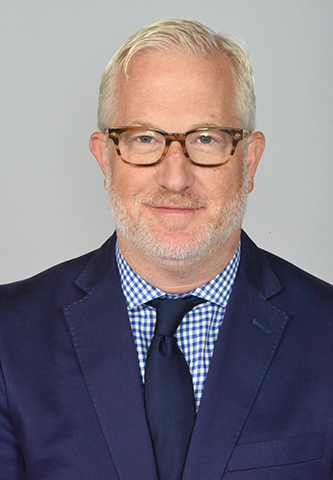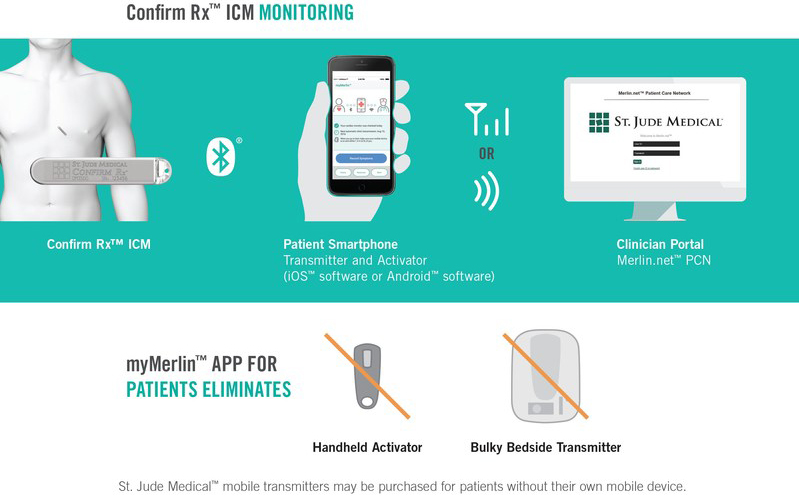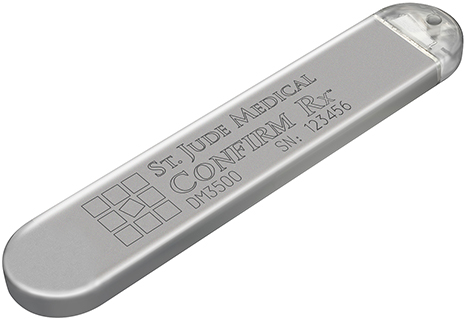
Abbott has developed an implantable device that continuously monitors the heart rhythm and allows for communication with a clinician via a smartphone. The paperclip-sized device, called the Confirm Rx insertable cardiac monitor (ICM), requires no re-charging and is inserted during an outpatient procedure that is often suture-free.
Monitoring a patient’s heart rhythm can tell clinicians a lot about why an individual might be experiencing symptoms, and the diagnoses made can be important in defining the best strategy for treatment. For instance, for patients with a documented rhythm abnormality, being able to calculate the risks associated with the specific abnormality may help tailor their therapy and potentially save a life.
Remote monitoring means that the patient does not need to be in a doctor’s office, hospital, or other medical facility and can go about living their daily life. Monitoring performed in this way means that measurements and recordings are more representative of events occurring during activities of daily living, and as the monitoring is occurring “around the clock” the details are comprehensive. The proliferation of wearable technology has undoubtedly helped doctors achieve this, but it has still been difficult to provide continuous monitoring with current devices requiring patient involvement including the need for regular re-charging.
The ConfirmRx device developed by Abbott has a battery that does not need to be re-charged and that can be implanted under the skin. As it is Bluetooth-enabled, it can connect and communicate with a patient’s smartphone using the MyMerlin smartphone app. The app allows patients to communicate their symptoms to their doctor, meaning that if they have a symptomatic episode, they can record their heart rhythm and within minutes provide their doctor with information about the event.
Developing the miniaturized implant required an interdisciplinary approach, including electrical engineering, materials science, software development, and mechanical engineering.
See a video about the device below:
[embedded content]
Medgadget had the opportunity to ask Avi Fischer, M.D., divisional vice president and medical director of Abbott’s cardiac rhythm management business, some questions about the device and how it’s helping cardiologists manage their patients.
Conn Hastings, Medgadget: Please give us an overview of cardiac rhythm disorders, and the need for long-term monitoring.

Avi Fischer, Abbott: A cardiac rhythm disorder, also known as a cardiac arrhythmia, is an abnormal rhythm of the heart that typically occurs when the chambers of the heart beat irregularly. The rhythm disorder can be either fast or slow and often results in symptoms such as the sensation a fast or irregular heart rhythm, dizziness, shortness of breath, lightheadedness and in some case loss of consciousness. The most common cardiac arrhythmia is atrial fibrillation or AFib, where the upper chambers of the heart “flutter” or “fibrillate” and beat irregularly. Some patients describe the symptoms from this condition as their heart “skipping a beat.” AFib, the most common abnormal heart rhythm disorder seen in clinical practice, affects as many as 6.1 million Americans. It is commonly associated with older age, high blood pressure, heart attacks and other diseases that have damaged the heart.
Long-term monitoring is important in patients with AFib, because it is typically intermittent, meaning the rhythm disorder comes and goes and can last at times for minutes, at times for hours or even for a few days at a time with intervals (days or weeks) between episodes. Therefore, the likelihood of detecting this abnormal heart rhythm specifically and only while at the doctor’s office is low. While in the office, if no AFib is occurring at the time, the patient’s electrocardiogram (ECG) will be normal. Physicians will typically prescribe a long-term monitoring device in an attempt to record episodes. If they detect an abnormal heart rhythm, the device can then inform a course of action and treatment strategy.
Medgadget: What makes current approaches to monitoring the heart unsatisfactory?
Avi Fischer: Current approaches aren’t necessarily unsatisfactory, but rather they are limited. Important to consider is that there are different levels of monitoring. When a patient is at risk for or has a known rhythm issue, a medically approved device is most often where doctors look for answers. However, because the ECG machine may not detect an abnormal heartbeat during a patient’s office visit, doctors often prescribe a Holter monitor, a battery-operated wearable device that is about the size of a small camera that is worn around a patient’s neck or waist. The device has electrodes that attach to the skin and record the heart rhythm the same way an ECG would – but over an extended period of time. However, a Holter device can be cumbersome to wear and as it is usually worn for several days, it can impede on a patient’s normal activities – like showering or exercise. Holter monitors can further delay the time to reaching a diagnosis because patients must wear the device, then after completion of the monitoring the device must be returned to their physician, the data and recordings are then downloaded and analyzed before a diagnosis and/or treatment strategy can be made.
A doctor may also prescribe an “event recorder” to monitor heart activity specifically when a patient starts experiencing symptoms or discomfort. This can also be challenging because in addition to the automated recordings made by the monitor, the aim is to capture the specific heart rhythm associated with the symptoms occurring in the patient. For symptom-triggered recordings, the patient needs to actively initiate the recording which in some situations may be a challenge such as if the patient is sleeping or not wearing the monitor at that specific time.
Today, regulatory authorities are granting approval to wearable devices, including fitness trackers with features similar to ECGs. While this is a big step forward in terms of being able to access heart monitoring technology and early awareness of potential heart rhythm problems for consumers, there are still limitations. Most people do not wear their devices all day or every day and these devices must be removed in order to re-charge. Fitness trackers may alert an individual to a possible heart problem, but a physician is likely to prescribe a continuous, remote monitor, like an Insertable Cardiac Monitor (ICM) to further evaluate, diagnose and confirm the presence of an arrhythmia after reviewing the recordings from a fitness tracker.

Medgadget: Please give us an overview of the Confirm Rx ICM system, and how it addresses the shortcomings of previous approaches.

Avi Fischer: The Confirm Rx ICM leverages real-time data gathered 24/7 and it is the only ICM that has Bluetooth capability for communication and data acquisition allowing the device to sync with the myMerlin app on a patient’s smartphone to keep physicians informed. The device and accompanying app are designed to help physicians quickly identify even the most difficult-to-detect heart rhythm abnormalities, including atrial fibrillation, and the system does it all remotely. The device, which is around the size of a paperclip, is implanted via a minimally invasive, out-patient procedure. The device automatically transmits daily data at a prespecified time using the myMerlin mobile app and also will transmit data “on demand” when a patient initiates a transmission for symptoms or other reasons.
The device provides patients with a new and simple way to monitor for abnormal heart rhythms and at the same time allows for the patient to be connected to their physician remotely and keeps them engaged. For physicians, the device helps manage patients more effectively while enhancing patient compliance through smartphone connectivity.
Medgadget: What types of heart conditions can the device help identify?
Avi Fischer: Confirm Rx is indicated for the monitoring and diagnostic evaluation of patients who experience unexplained symptoms such as dizziness, heart palpitations, chest pain, fainting and shortness of breath. It is also indicated for patients with known AFib as well as in the monitoring of patients who have had a cryptogenic stroke – which is a stroke of an obscure or unknown origin.
Medgadget: How has the device been received by patients and clinicians so far?
Avi Fischer: The feedback we have received from both doctors and patients has been fantastic.
Physicians report that the device allows them to monitor patients using this tiny device and that the device provides them the ability to quickly diagnose and treat an arrhythmia.
Many patients have indicated that, there have been times throughout their life where they have experienced heart palpitations and have periodically felt lightheaded or dizzy but they were never diagnosed. After being implanted with a Confirm Rx device, they report feeling that their cardiologist was able to have more real-time information and to properly diagnose them and prescribe a course of treatment to best suit their needs. Others have reported being able to work with their physicians to rule out AFib or other heart rhythm abnormalities by using the Confirm Rx device and as a result begin focusing on other potential causes for their symptoms.
The patient-centric MyMerlin app was designed with patient feedback and has been successfully used by people of many demographics—not just the overly tech savvy—and it’s available in nearly 40 languages.
Medgadget: What are your future plans for this type of technology?
Avi Fischer: We are always looking for new advances in remote monitoring technology. Future plans for this type of technology will leverage the data we gather from these devices to not only share with physicians, but to become a part of a fully integrated healthcare solution.
We’re seeing dramatic technological advances in monitoring for things like psychological states that impact blood pressure, heart rates, insulin levels and asthma. Soon, we’ll be able to correlate sensations and symptoms with biological data. Hopefully with a more complete view of a patient’s condition, we will be able to help them live their best possible life.

Flashback: Abbott Releases First Insertable Cardiac Monitor That Works with Your Smartphone…; Abbott’s Confirm Rx Implantable Cardiac Monitor Connects to Smartphones, FDA Cleared…
Product page: Confirm Rx…
